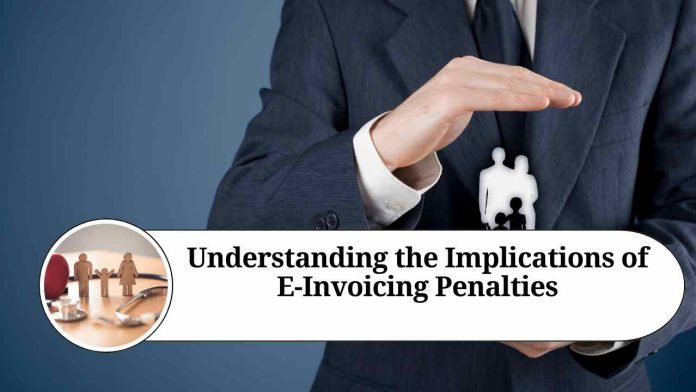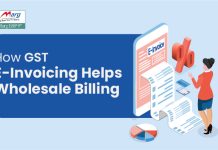Introduction
In recent years, the adoption of electronic invoicing (e-invoicing) has rapidly gained momentum across the globe. With its numerous advantages, including efficiency, cost savings, and reduced environmental impact, e-invoicing has become a preferred method for businesses to streamline their invoicing processes. However, it is crucial to be aware of the potential consequences of non-compliance with e-invoicing regulations. In this blog, we will delve into the world of e-invoicing penalties, shedding light on their significance and the importance of adhering to the requirements.
E-Invoicing:
A Brief Overview Before we dive into the details of penalties, let’s understand the basics of e-invoicing. E-invoicing refers to the electronic generation, submission, and archiving of invoices in a standardized digital format. It eliminates the need for manual handling of paper invoices, leading to enhanced accuracy, efficiency, and traceability in the invoicing process. Several countries have mandated or encouraged the implementation of e-invoicing to improve tax compliance and streamline business operations.
The Role of E-Invoicing Penalties E-invoicing penalties are regulatory measures put in place to enforce compliance with e-invoicing requirements. The penalties act as a deterrent, encouraging businesses to comply with the prescribed standards and avoid potential violations. The severity of penalties can vary depending on the jurisdiction, the nature of non-compliance, and the specific regulations in place.
Common Reasons for E-Invoicing Penalties
To avoid penalties, businesses must be aware of the common pitfalls that can lead to non-compliance with e-invoicing regulations. Some key reasons include:
a. Incomplete or inaccurate information: E-invoices must contain all the necessary details required by the respective tax authorities, such as tax identification numbers, invoice numbers, item descriptions, and correct financial information. Failure to include accurate and complete information can result in penalties.
b. Non-compliance with data formatting requirements: E-invoicing regulations often prescribe specific data formats, such as XML or EDI. Deviating from these formats or failing to adhere to the specified guidelines may result in penalties.
c. Failure to meet submission deadlines: Many jurisdictions require businesses to submit e-invoices within a specific timeframe. Missing these deadlines or delaying invoice submissions can attract penalties.
d. Inadequate record-keeping: E-invoicing regulations often require businesses to maintain electronic records of invoices for a specific period. Failing to maintain proper records or not providing them upon request can lead to penalties.
Consequences of E-Invoicing Penalties
Non-compliance with e-invoicing regulations can have serious consequences for businesses. These penalties may include:
a. Financial penalties: Businesses may face monetary fines, which can range from fixed amounts to a percentage of the value of the invoice or even the total value of the transactions conducted.
b. Legal repercussions: In some cases, severe or repeated non-compliance can result in legal action, including lawsuits or prosecution.
c. Reputational damage: Penalties can tarnish a company’s reputation and erode trust among customers, suppliers, and business partners.
d. Loss of business opportunities: Failure to comply with e-invoicing requirements may disqualify businesses from participating in government contracts or partnerships that mandate adherence to specific invoicing standards.
Steps to Ensure E-Invoicing Compliance
To mitigate the risk of penalties, businesses can take proactive measures to ensure e-invoicing compliance:
a. Stay informed: Keep track of the e-invoicing regulations in your jurisdiction and any updates or changes to ensure you are up to date with the latest requirements.
b. Implement robust processes: Establish standardized procedures for creating, validating, and archiving e-invoices, ensuring compliance with the relevant guidelines.
c. Utilize compliance software: Consider using specialized e-invoicing software or services that can help automate compliance checks and ensure adherence to the required formats and data standards.
d. Conduct regular audits: Periodically review your e-invoicing processes and records to identify any potential compliance gaps and address them promptly.
Conclusion
While e-invoicing offers significant benefits to businesses, it is vital to prioritize compliance with the relevant regulations. Understanding the implications of e-invoicing penalties and taking proactive steps to ensure compliance can help businesses avoid financial losses, legal troubles, and reputational damage. By embracing e-invoicing best practices and staying informed, organizations can navigate the evolving landscape of e-invoicing regulations and optimize their invoicing processes in a compliant and efficient manner.
Read more useful content:
Frequently Asked Questions (FAQs)
Q1: What is an e-invoicing penalty?
A1: An e-invoicing penalty is a punitive measure imposed by regulatory authorities for non-compliance with e-invoicing regulations. It serves as a deterrent and encourages businesses to adhere to the prescribed standards and requirements.
Q2: What are the common reasons for e-invoicing penalties?
A2: Common reasons for e-invoicing penalties include incomplete or inaccurate information on invoices, non-compliance with data formatting requirements, failure to meet submission deadlines, and inadequate record-keeping of e-invoices.
Q3: What are the potential consequences of e-invoicing penalties?
A3: The consequences of e-invoicing penalties can include financial fines, legal action or prosecution, reputational damage, and loss of business opportunities, such as disqualification from government contracts or partnerships.
Q4: How can businesses avoid e-invoicing penalties?
A4: To avoid e-invoicing penalties, businesses can take several steps, including staying informed about e-invoicing regulations, implementing robust processes, utilizing compliance software, conducting regular audits, and seeking professional guidance if needed.
Q5: Are e-invoicing penalties consistent across different jurisdictions?
A5: E-invoicing penalties can vary depending on the jurisdiction, as different countries or regions may have their own regulations and enforcement mechanisms. It is crucial for businesses to understand and comply with the specific requirements of their operating jurisdiction.
Q6: Can e-invoicing penalties be negotiated or appealed?
A6: The possibility of negotiating or appealing e-invoicing penalties depends on the specific regulations and legal frameworks in place. In some cases, businesses may have the opportunity to present their case or rectify any non-compliance within a given timeframe.
Q7: Is there a difference in penalties for unintentional and deliberate non-compliance?
A7: Some jurisdictions may differentiate penalties based on the nature of non-compliance. Unintentional errors or minor violations may attract lesser penalties compared to deliberate non-compliance or significant violations.
Q8: How can businesses ensure e-invoicing compliance?
A8: To ensure e-invoicing compliance, businesses should stay updated on regulations, implement standardized processes, use compliance software, conduct regular audits, and seek professional assistance to navigate complex requirements.
Q9: Can outsourcing e-invoicing processes help in avoiding penalties?
A9: Outsourcing e-invoicing processes to specialized service providers can help ensure compliance as they are well-versed in the regulations and have the necessary infrastructure and expertise to handle e-invoicing requirements effectively.
Q10: What are the long-term benefits of e-invoicing compliance?
A10: Achieving e-invoicing compliance brings long-term benefits such as streamlined invoicing processes, enhanced efficiency, cost savings, improved accuracy, reduced environmental impact, and the ability to participate in government contracts or partnerships that require adherence to specific invoicing standards.




















